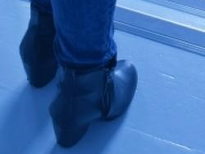Nina

(Text only clips) Nina developed acne when she was 12. She has tried different treatments, finding antibiotics which she initially tried when 13 to be more helpful at age 16. Nina would like to see more advice for young people on how to not let acne affect confidence.
Nina is 20 years old and a university student.
More about me...
Nina was first diagnosed with acne when she was 12. At first she felt like her spots were a normal part of being a teenager. However, as she got older, she felt like most of her peers’ spots had cleared up whilst hers hadn’t. She feels that other people often expect a person with acne to be able to cure their skin condition and she finds this frustrating. Nina experiences some difficulties with her mood and self-esteem. Nina also has a diagnosis of OCD which can interact with her acne; for example, she can feel very unsettled if she doesn’t follow her daily skincare routine.
Nina saw her GP for various different treatments but they didn’t seem to make much of a difference. When she was age 14, she was offered the contraceptive pill but declined it as she felt embarrassed by what people at her school might think. She was also offered some antibiotics but she was worried about taking them as one of the side effects included low mood. As she got older, Nina was referred to a dermatologist and her skin improved at 16 when she began a new antibiotic.
Nina went to an all-girls secondary school where she felt there was a lot of emphasis on appearance. It seemed that the better you looked, the higher up you were in the social hierarchy. Although Nina had friends at school, she thinks she may have had more if she had not had acne. Nina has recently started at university and although her skin is much better now than when she was younger, she still worries about how people will perceive her when they first meet. She spends quite a bit of time on her appearance before she goes out. She feels comfortable playing sports though as she says people tend to not look their best whilst exercising and so she worries less about her skin.
Nina would like to see more advice for young people on how to not let having acne affect confidence. She also thinks that it would be helpful to give school students more information about skincare, bearing in mind that many young people cannot afford expensive products. She would like for doctors to take acne seriously and to help young people express their concerns about how they feel, rather than “brushing them aside”. This includes the impact of acne on self-esteem and mental health.


